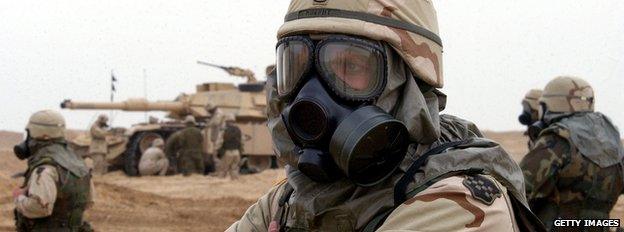Could US remove Syria chemical weapons?
- Published
- comments

President Barack Obama's warning about Syria's unconventional weapons arsenal is one of those "sit up and take notice" moments. He warned, "we cannot have a situation where chemical or biological weapons are falling into the hands of the wrong people".
The US president added, "we have put together a range of contingency plans".
These are thought to range from air strikes on key depots to special operations to seizing key stockpiles.
Is the idea of American Hercules transports landing in the middle of Syria, while special forces bring trucks full of nerve gas shells to load on board credible? Certainly, the White House want us to believe it is.
For many years the Syrian regime regarded the possession of a powerful arsenal of ballistic missiles armed with chemical warheads (including nerve agents) as its strategic counter-weight to the Israeli nuclear bomb.
At one point, it would appear, they decided a Syrian nuclear capability would be handy too, but Israel put paid to that in 2007, external with an air raid against the suspected secret atomic research facility.
That unilateral Israeli strike demonstrated the critical value of good intelligence in countering any threat of this kind. The West's unhappy experience with weapons of mass destruction (WMD) in Iraq showed the pitfalls of acting on a flawed picture.
Syria's long term investment in missiles and chemical weapons means that the world's intelligence agencies do know a good deal about its capabilities in these areas. There are stockpiles of thousands of munitions (bombs for aircraft, artillery shells or missile warheads) as well as hundreds of missiles.
Fearing a first strike to disarm them, Syria positioned much of the infrastructure far away from its Zionist enemy. Thus the 63rd and 72nd Missile Brigades of the Syrian army - holders of the Scud and SS-23s that could carry chemical warheads - are centred south-west of Aleppo in the far north of the country.
For similar reasons the main chemical weapons production facility is also close to the city.
It is a bitter irony of the current crisis that far from being safe, Aleppo is now at the centre of fighting between government and opposition forces.
There are fears among Western intelligence analysts either that militant groups might obtain them, or that they might be passed to organisations like Hezbollah in Lebanon or even used to defend the regime.
Israeli reports have already suggested that some Scud missiles may have been sent to Hezbollah in Lebanon.
So how able would the United States be to put into effect the "contingency plans" that Mr Obama referred to?
Intelligence about some kinds of weapons, notably the biological agents that Syria is believed to have developed, is patchy.
On chemical weapons, the key would be to isolate the storage sites and take over the stocks, or, in an emergency, destroy them in situ.
While the Israelis have talked about a centralised system for holding these munitions with six main locations (manageable), UK/US analysis suggests a distributed network of 30-40 chemical weapons dumps (much more of a challenge).
During the Cold War and events of 1991-2003 in Iraq the problem of gaining sound intelligence on chemical weapons was encountered over and over again.
A satellite may pinpoint storage tanks or bunkers for storing artillery shells, and accompanying indicators like special security fences or guard posts may suggest a WMD role. But when it comes to working out whether such facilities are empty or full, whether the agents are stable or what type they are, analysts are often guessing.
Human intelligence, old fashioned spying, has proven all too fallible too. Many of Saddam Hussein's generals earnestly believed that Iraq had large stockpiles of chemical weapons until the end.
Indeed there is some evidence that even the Iraqi leader may have thought that more of his WMD infrastructure may have survived years of UN inspections than was actually the case.
If the intelligence is sound, then the practical side of seizing these weapons stockpiles, and destroying the long range missiles, might not be insurmountable.
Among Syria's neighbours, Turkey, Jordan, and Israel would both have a strong interest in allowing access to US forces to mount such raids.
However, if the information about dozens of storage sites is right, then there is a distinct possibility that significant quantities of these weapons could go missing, even if the US plans were 95% effective.